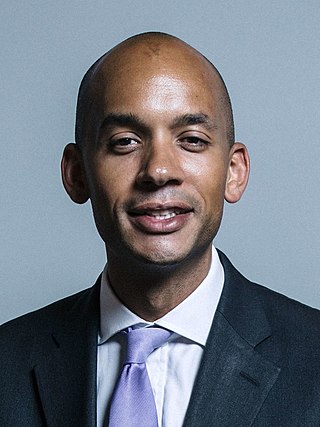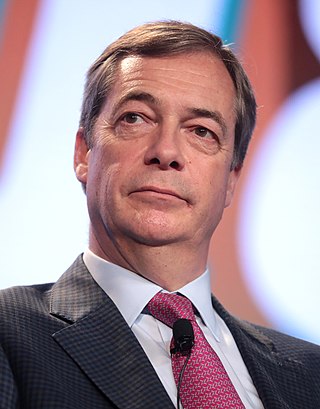
The politics of the United Kingdom functions within a constitutional monarchy where executive power is delegated by legislation and social conventions to a unitary parliamentary democracy. From this a hereditary monarch, currently King Charles III, serves as head of state while the Prime Minister of the United Kingdom, currently Rishi Sunak since 2022, serves as the elected head of government.

Jeremy Bernard Corbyn is a British politician who served as Leader of the Opposition and Leader of the Labour Party from 2015 to 2020. On the political left of the Labour Party, Corbyn describes himself as a socialist. He has been Member of Parliament (MP) for Islington North since 1983. As of October 2020, Corbyn sits in the House of Commons as an independent, following the suspension of the whip.

Philip Wilson is a British Labour Party politician. He was elected as Member of Parliament (MP) for Sedgefield in a by-election that followed the resignation of Tony Blair, former Prime Minister, from the seat. He lost the seat at the 2019 general election to Paul Howell of the Conservative Party.

Chuka Harrison Umunna is a British businessman and former politician who served as Member of Parliament (MP) for Streatham from 2010 until 2019. A former member of the Labour Party, he was part of the Shadow Cabinet from 2011 to 2015. He left Labour in February 2019, when he resigned to form The Independent Group, later Change UK, along with six other MPs. Later in 2019, he left Change UK and, after a short time as an independent MP, joined the Liberal Democrats. In the 2019 general election, he was unsuccessful in being re-elected as an MP and did not return to the House of Commons.

The Liberal Democrats are a liberal political party in the United Kingdom, founded in 1988. They have been the third-largest UK political party by the number of votes cast since the 1992 general election, with the exception of the 2015 general election. They have 15 members of Parliament in the House of Commons, 84 members of the House of Lords, four Members of the Scottish Parliament and one member in the Welsh Senedd. The party has nearly 3,000 local council seats. The party holds a twice-per-year Liberal Democrat Conference, at which party policy is formulated. In contrast to its main opponents' conference rules, the Lib Dems grant all members attending its Conference the right to speak in debates and vote on party policy, under a one member, one vote system. The party also allows its members to vote online for its policies and in the election of a new leader. The party served as the junior party in a coalition government with the Conservative Party between 2010 and 2015; with Scottish Labour in the Scottish Executive from 1999 to 2007; and with Welsh Labour in the Welsh Government from 2000 to 2003 and from 2016 to 2021.
The Labour Party is a political party in the United Kingdom that has been described as an alliance of social democrats, democratic socialists, and trade unionists. The Labour Party sits on the centre-left of the political spectrum. In all general elections since 1922, Labour has been either the governing party or the Official Opposition. There have been six Labour prime ministers and thirteen Labour ministries. Since the 2010 general election, it has been the second-largest UK political party by the number of votes cast, behind the Conservative Party and ahead of the Liberal Democrats. The party holds the annual Labour Party Conference.

The 2017 United Kingdom general election was held on Thursday 8 June 2017, two years after the previous general election in 2015; it was the first since 1992 to be held on a day that did not coincide with any local elections. The governing Conservative Party remained the largest single party in the House of Commons but lost its small overall majority, resulting in the formation of a Conservative minority government with a confidence and supply agreement with the Democratic Unionist Party (DUP) of Northern Ireland.
The 2015 Labour Party leadership election was triggered by the resignation of Ed Miliband as Leader of the Labour Party on 8 May 2015, following the party's defeat at the 2015 general election. Harriet Harman, the Deputy Leader, became Acting Leader but announced that she would stand down following the leadership election. It was won by Jeremy Corbyn in the first round. Coterminous with the leadership election, in the 2015 Labour Party deputy leadership election, Tom Watson was elected to succeed Harman as deputy leader.

The 2019 United Kingdom general election was held on Thursday 12 December 2019 with 47,074,800 registered voters entitled to vote to elect members of the House of Commons. The Conservative Party won a landslide victory with a majority of 80 seats, a net gain of 48, on 43.6% of the popular vote, the highest percentage for any party since the 1979 general election.

The 2019 European Parliament election was the United Kingdom's component of the 2019 European Parliament election, held on Thursday 23 May 2019 and the results were announced on Sunday 26 and Monday 27 May 2019, after all the other EU countries had voted. This was the United Kingdom's final participation in a European Parliament election before leaving the European Union on 31 January 2020, and was also the last election to be held under the provisions of the European Parliamentary Elections Act 2002 before its repeal under the European Union (Withdrawal) Act 2018.
Momentum is a British left-wing political organisation which has been described as a grassroots movement supportive of the Labour Party; since January 2017, all Momentum members must be members of the party. It was founded in 2015 by Jon Lansman, Adam Klug, Emma Rees and James Schneider after Jeremy Corbyn's successful campaign to become Labour Party leader and it was reported to have between 20,000 and 30,000 members in 2021.
The 2016 Labour Party leadership election was called when a challenge to Jeremy Corbyn as Leader of the Labour Party arose following criticism of his approach to the Remain campaign in the referendum on membership of the European Union and questions about his leadership of the party.

The Labour Party leadership of Jeremy Corbyn began when Jeremy Corbyn was elected as Leader of the UK Labour Party in September 2015, following the resignation of Ed Miliband after Labour's defeat at the 2015 general election. Disillusioned by a lack of a left-wing voice in the 2015 leadership contest, Corbyn stood on an anti-austerity platform. Of the candidates who stood, Corbyn received the fewest parliamentary nominations. Many who nominated him said they had done so not to support his candidacy, but to widen the debate by including a socialist voice. However, Corbyn soon became the frontrunner and was elected with a landslide of 59%.

On 1 December 2016, a by-election was held in the UK parliamentary constituency of Richmond Park. It was triggered by the resignation of the Conservative Member of Parliament Zac Goldsmith on 25 October 2016 over the Government's proposal for a third runway at the nearby Heathrow Airport. It was won by Sarah Olney of the Liberal Democrats, after a campaign focused on opposition to Brexit.

The 2019 Conservative Party leadership election was triggered when Theresa May announced on 24 May 2019 that she would resign as leader of the Conservative Party on 7 June and as Prime Minister of the United Kingdom once a successor had been elected. Nominations opened on 10 June; 10 candidates were nominated. The first ballot of members of Parliament (MPs) took place on 13 June, with exhaustive ballots of MPs also taking place on 18, 19 and 20 June, reducing the candidates to two. The general membership of the party elected the leader by postal ballot; the result was announced on 23 July, with Boris Johnson being elected with almost twice as many votes as his opponent Jeremy Hunt.
Change UK, founded as The Independent Group (TIG) and later The Independent Group for Change, was a British centrist, pro–European Union political party, which lasted for ten months in 2019. Established in February and formally recognized as a party in May, it was dissolved in December after all its MPs lost their seats at that year's general election. Its principal aim was a second withdrawal referendum on European Union membership, in which it would campaign to remain in the EU. On economic issues it expressed a commitment to the social market economy.

A referendum on the Brexit withdrawal agreement, also referred to as a "second referendum", a "rerun", a "people's vote", or a "confirmatory public vote", was proposed by a number of politicians and pressure groups as a way to break the deadlock during the 2017–19 Parliament surrounding the meaningful vote on the Brexit deal.
Brexit was the withdrawal of the United Kingdom from the European Union at 23:00 GMT on 31 January 2020. As of 2020, the UK is the only member state to have left the EU. Britain entered the predecessor to the EU, the European Communities (EC), on 1 January 1973. Following this, Eurosceptic groups grew in popularity in the UK, opposing aspects of both the EC and the EU. As Euroscepticism increased during the early 2010s, Prime Minister David Cameron delivered a speech in January 2013 at Bloomberg London, in which he called for reform of the EU and promised an in–out referendum on the UK's membership if the Conservative Party won a majority at the 2015 general election. The Conservatives won 330 seats at the election, giving Cameron a majority of 12, and a bill to hold a referendum was introduced to Parliament that month.

Felicity Christiana Buchan is a British politician and former banker who serves as the Member of Parliament (MP) for Kensington in London. A member of the Conservative Party, serving as Parliamentary Under-Secretary of State for Housing and Homelessness in the Department for Levelling Up, Housing and Communities since October 2022. Prior to this, Buchan served as Exchequer Secretary to the Treasury from September to October 2022.
2010s political history refers to significant political and societal historical events in the United Kingdom in the 2010s, presented as a historical overview in narrative format.